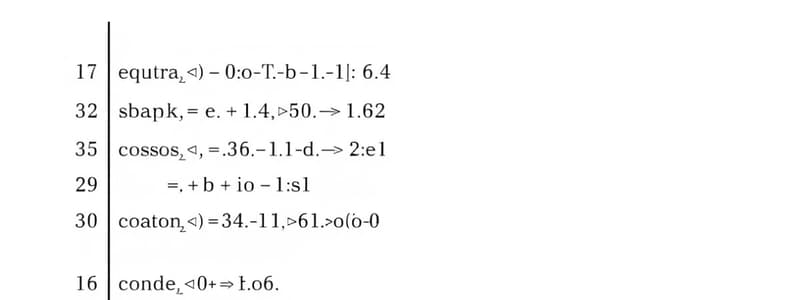Podcast
Questions and Answers
What is the Exponential Approximation?
What is the Exponential Approximation?
log both sides, log(1+x) ~ x, solve for P ~ e
What does the Addition Rule state?
What does the Addition Rule state?
If A and B are mutually exclusive events, P(AB) = P(A) + P(B)
What is the Difference Rule?
What is the Difference Rule?
If B is a subset of A, P(A not B) = P(A) - P(B)
What does the Complement Rule state?
What does the Complement Rule state?
What is Conditional Probability / Bayes Rule?
What is Conditional Probability / Bayes Rule?
What is the Multiplication Rule for Independent Events?
What is the Multiplication Rule for Independent Events?
What is the Multiplication Rule for Dependent Events?
What is the Multiplication Rule for Dependent Events?
What defines RV-Equality?
What defines RV-Equality?
What does Inclusion-Exclusion for unions state?
What does Inclusion-Exclusion for unions state?
What is meant by the Union of a collection?
What is meant by the Union of a collection?
What is the Complement of the union?
What is the Complement of the union?
What does Boole's Inequality state?
What does Boole's Inequality state?
Flashcards are hidden until you start studying
Study Notes
Probability Rules and Concepts
-
Exponential Approximation: Utilizing logarithmic properties, log(1+x) approximates to x, leading to solutions resembling P ~ e.
-
Addition Rule: For mutually exclusive events A and B, the probability of either event occurring is P(AB) = P(A) + P(B).
-
Difference Rule: If event B is a subset of event A, the probability of A excluding B is calculated as P(A not B) = P(A) - P(B).
-
Complement Rule: The probability of the complement of event A is expressed as P(A^c) = 1 - P(A).
Conditional Probability
- Conditional Probability / Bayes Rule: The probability of event A given event B is determined by P(A|B) = P(AB)/P(B), and is also expressed as P(A)P(B|A) / P(B).
Multiplication Rules
-
Multiplication Rule for Independent Events: When events A and B are independent, their joint probability is given by P(AB) = P(A) * P(B).
-
Multiplication Rule for Dependent Events: If events A and B are dependent, the joint probability can be calculated as P(AB) = P(A)*P(B|A) or equivalently P(AB) = P(B)*P(A|B).
Random Variables
- RV-Equality: Two random variables (RVs) are considered equal if they exhibit identical values across all possible outcomes.
Union and Intersection of Events
-
Inclusion-Exclusion Principle: The probability of the union of two events A and B is defined as P(A or B) = P(A) + P(B) - P(AB).
-
Union of a Collection of Events: Refers to the occurrence of at least one event within a given collection, with approaches like the Addition Rule for mutually exclusive events, Inclusion-Exclusion when P(AB) is known, and Boole's Inequality for assessing bounds.
-
Complement of the Union: Represents the event where none of the specified events occurs.
Boole's Inequality
- Boole's Inequality: Offers an upper limit on the probability of the union of multiple events. The likelihood of at least one event occurring is no greater than the sum of their individual probabilities, particularly useful when the dependence between events is unknown. Example: Given rain probabilities of 40% and 10% on Saturday and Sunday respectively, the chance of rain occurring on at least one day is 40%.
Studying That Suits You
Use AI to generate personalized quizzes and flashcards to suit your learning preferences.




